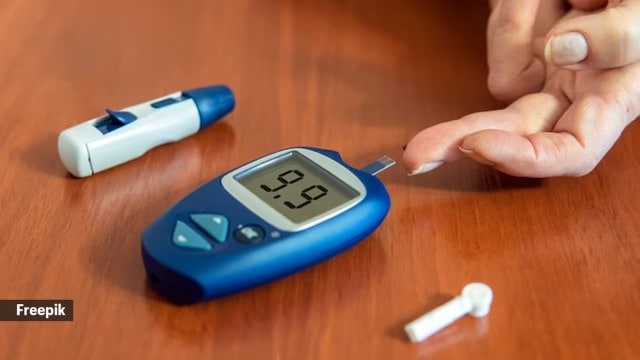📣 For more lifestyle news, click here to join our WhatsApp Channel and also follow us on Instagram
Can you eat whatever you want after ‘reversing’ type 2 diabetes?
Ipsita Chakraborty, senior nutritionist at Hungry Koala says, “Reversing type 2 diabetes means your blood sugar levels are within a normal range without the need for diabetes medication.”
 Recognising these early warning signs can be crucial in preventing or managing the onset of diabetes. (Source: Freepik)
Recognising these early warning signs can be crucial in preventing or managing the onset of diabetes. (Source: Freepik)For those who have achieved the remarkable feat of achieving remission after being diagnosed with type 2 diabetes through lifestyle changes and effective management, the temptation to celebrate by indulging in all the foods previously avoided can be strong. But should they return to their old eating patterns without consequence, or does long-term dietary vigilance remain essential?
Certified dietician Charmaine Ha Dominguez says that when it comes to “reversing” type 2 diabetes, “it depends.” She continues, “If you eat a high-fat diet all over again, it contributes to insulin resistance which can bring back type 2 diabetes.”
She further explains that the key is eating “healthy most of the time” and still being flexible when it comes to your diet.
View this post on Instagram
Ipsita Chakraborty, senior nutritionist at Hungry Koala says, “Achieving remission (as reversal is very rare) means maintaining normal blood sugar levels, but dietary vigilance remains crucial. The American Diabetes Association emphasises the importance of continuing to follow healthy eating guidelines to keep blood sugar stable and avoid relapse.”
Returning to old dietary habits that contributed to diabetes is not recommended, asserts Chakraborty. “The same foods that led to high blood sugar levels before can still do so. The Cleveland Clinic emphasises that a balanced diet remains crucial to sustain remission. Ongoing dietary restrictions, particularly reducing high-sugar and high-fat foods, are necessary.”
Foods to prioritise or avoid
Chakraborty stresses that one must prioritise foods such as whole grains, lean proteins, vegetables, fruits, and healthy fats. “These foods help maintain stable blood sugar levels,” she says.
Avoid eating processed foods, sugary drinks, refined carbohydrates, and high-fat, high-sodium foods. These can lead to spikes in blood sugar and potentially undo the progress made.
 Avoid eating processed foods, sugary drinks, refined carbohydrates, and high-fat, high-sodium foods. (Source: Freepik)
Avoid eating processed foods, sugary drinks, refined carbohydrates, and high-fat, high-sodium foods. (Source: Freepik)
According to Chakraborty, maintaining metabolic health post-reversal requires a consistent dietary approach. “Regular physical activity, portion control, and monitoring carbohydrate intake are essential strategies. According to a study in the journal Diabetes Care, sustaining these practices helps prevent the reoccurrence of type 2 diabetes.”
Strategies for long-term maintenance
Chakraborty mentions the following strategies to help individuals maintain their metabolic health long-term
*Regular Monitoring: Keep track of your blood sugar levels to catch any irregularities early.
*Balanced Diet: Continue eating a variety of nutrient-dense foods.
*Physical Activity: Incorporate regular exercise into your routine.
*Medical Guidance: Regular check-ups with your healthcare provider to adjust your plan as needed.
📣 For more lifestyle news, click here to join our WhatsApp Channel and also follow us on Instagram



- 01
- 02
- 03
- 04
- 05























